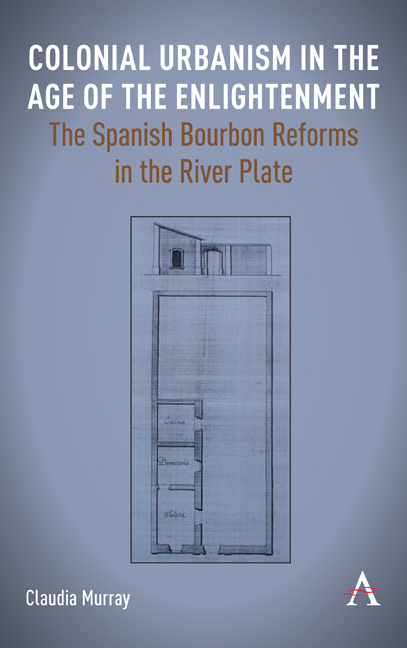Book contents
- Frontmatter
- Contents
- List of Figures and Tables
- Acknowledgements
- Introduction
- 1 The Spanish Empire Before the Bourbon Reforms
- 2 The River Plate Before 1776 and the Bourbon Reforms
- 3 Urban Expansion
- 4 The Image of Power
- 5 Ceremonies of Power
- 6 Disciplining Porteños’ Private Architecture
- 7 The British Assault on the River Plate
- Appendix 1
- Bibliography
- Index
7 - The British Assault on the River Plate
Published online by Cambridge University Press: 28 February 2024
- Frontmatter
- Contents
- List of Figures and Tables
- Acknowledgements
- Introduction
- 1 The Spanish Empire Before the Bourbon Reforms
- 2 The River Plate Before 1776 and the Bourbon Reforms
- 3 Urban Expansion
- 4 The Image of Power
- 5 Ceremonies of Power
- 6 Disciplining Porteños’ Private Architecture
- 7 The British Assault on the River Plate
- Appendix 1
- Bibliography
- Index
Summary
The Enemy, the Cabildo and the Defence of the City
On 27 June 1806, Porteños awoke to the news that they were no longer Spanish subjects but part of the British Empire. The political consequences of the assault and seizure of the capital of the viceroyalty have been studied by many as the spark that started the Wars of Independence in the River Plate. The aim here is to contribute to these studies through the perspective of space and power and show how the control of the city and its urban development achieved by the Cabildo and the Porteños soon became political control.
As seen in the first chapter, the creation of the viceroyalty of the River Plate and the tightening of the commercial regulations by the Bourbons drastically reduced the area's contraband trade in the late eighteenth century. This left Britain looking for other ways to keep and expand its commercial activities in this profitable area. Trade with the Americas was favoured by the then prime minister William Pitt (1759–1806) who had the support of Francisco de Miranda (1750–1816). Miranda was a Creole and a main instigator of the revolution against Spain; he intended to cooperate with the British as long as the freedom from Spain was guaranteed to the colonies. Miranda had travelled the world in support for the colonies’ freedom but had received little help from the United States and France, turning therefore to Britain, where he met members of a South American lobby group that had been working for the British government to back an expedition to Buenos Aires since the late 1790s. Pitt, Miranda and Commodore Home Popham (1762–1820) met in London in 1803 and discussed possibilities. Popham and Miranda have both been described as a pair of opportunistic mavericks, so after the successful capture of Cape Town for the British Empire in 1806, it is no surprise that Popham immediately saw the chance to sail from here to Buenos Aires and capture this city as well. He was acting also on some intelligence received from Thomas Wayne, an American merchant-ship captain, who described the defenceless state of Buenos Aires with less than one thousand troops, adding on a more personal note that Porteños would welcome freedom from Spain.
- Type
- Chapter
- Information
- Colonial Urbanism in the Age of the EnlightenmentThe Spanish Bourbon Reforms in the River Plate, pp. 199 - 212Publisher: Anthem PressPrint publication year: 2023



